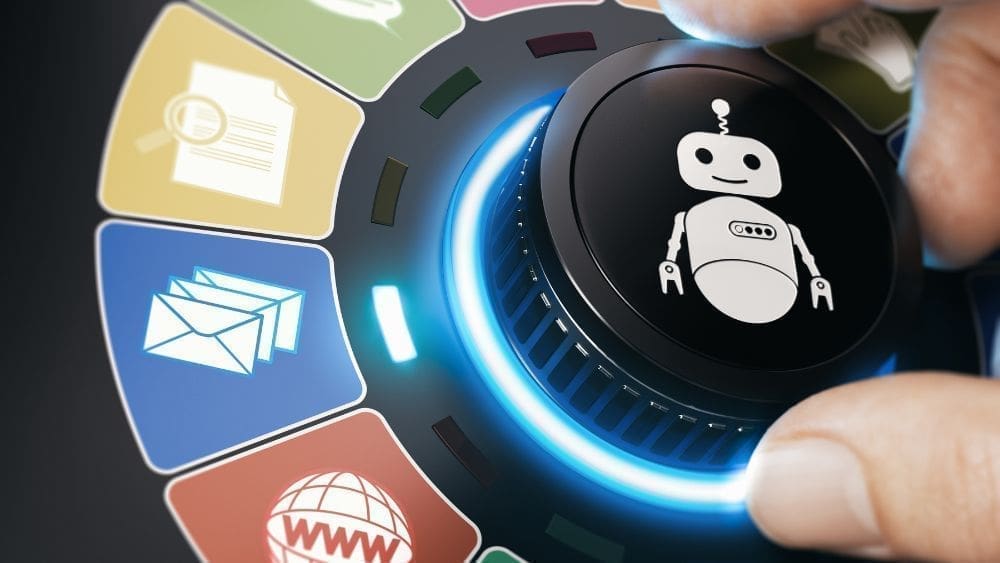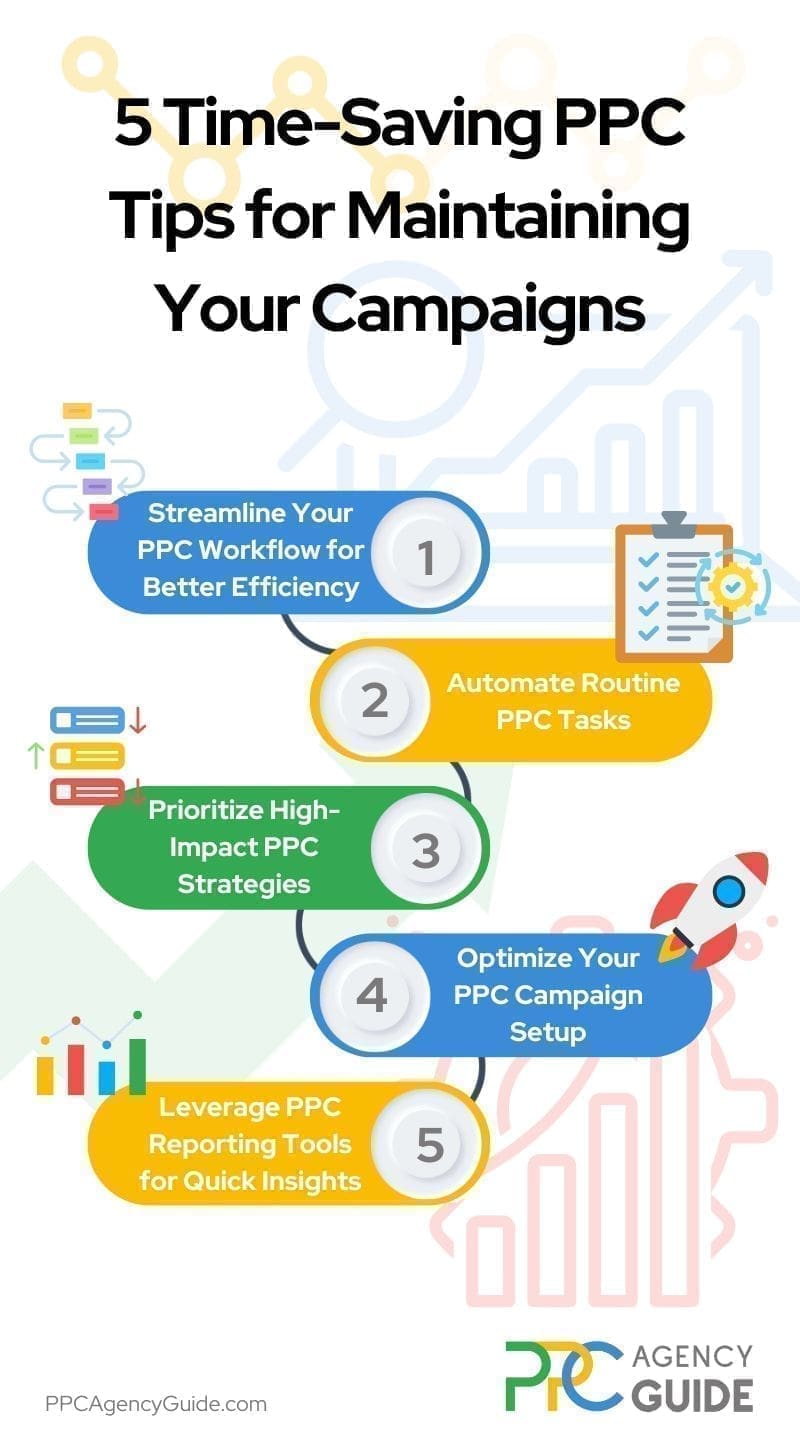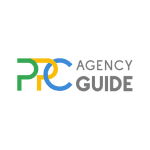
Google Ads boast a staggering two hundred percent ROI, HubSpot reports. With such promising results, it’s clear why more and more marketers are looking for smarter, quicker ways to manage pay-per-click (PPC) campaigns. Efficient PPC management saves valuable time and can significantly improve campaign outcomes. In this guide, we’ll explore five key strategies to streamline your PPC efforts, ensuring you get the best results without the extra hassle.
1. Streamline Your PPC Workflow for Better Efficiency
Efficient workflow is key to managing well-performing PPC campaigns and allowing you to allocate your time to strategic thinking and analysis. Below, we’ll quickly review some actionable steps to streamline your PPC workflow.
- Use Project Management Tools: Tools like Wrike, Asana, or Zoho Projects can help organize tasks, deadlines, and communications for your PPC campaigns. They make it easier to see what needs to be done and by when.
- Create Standardized Checklists: Having a checklist for campaign setup, monitoring, and optimization processes ensures consistency and covers all necessary steps without missing out on important tasks.
- Template Everything Possible: From ad copy to campaign structures, use templates to speed up the creation process. This allows you to maintain quality while cutting down on setup time.
2. Automate Routine PPC Tasks
Automation can transform how you manage PPC campaigns, making it possible to handle repetitive tasks quickly and accurately. This shift saves time and allows for more consistent and effective campaign management. Automate your PPC tasks with the steps outlined below.

- Identify Repetitive Tasks: Start by identifying repetitive and time-consuming tasks. These could include bid adjustments, ad placements, and keyword optimizations.
- Choose the Right Tools: Utilize automation tools to help manage bids, adjust campaigns based on performance, and more. Your advertising platform will have native tools, or you can purchase third-party PPC tools, such as SEMrush, to automate tasks.
- Set Clear Rules for Automation: Define clear parameters and rules for automation to follow. This ensures that automation works within your strategic goals, adjusting bids or pausing ads based on performance metrics you deem important.
- Monitor and Adjust: While automation takes care of the routine, monitoring its performance and adjusting the rules as necessary is crucial. This oversight ensures that automation continues to align with your campaign objectives and market changes.
3. Prioritize High-Impact PPC Strategies
Focusing on high-impact strategies ensures your PPC campaigns deliver the best results with efficient use of your time. Implementing strategies with a proven success track record can significantly enhance your campaign outcomes. Prioritize these strategies for maximum impact with the strategies below.
- Focus on Quality Keywords: Concentrate your efforts on keywords that have demonstrated high conversion rates. This approach ensures your ads reach the most relevant audience.
- Optimize for High-Performing Ad Placements: Analyze data to identify where your ads perform best, such as on certain websites or in specific positions on search results pages, and focus your bidding strategies there.
- Leverage Audience Targeting: Use detailed audience segmentation to tailor your ads to specific user groups. This increases the relevance of your ads, improving click-through and conversion rates.
- Refine Ad Copy Regularly: Keep your ad copy fresh and closely aligned with your target audience’s interests and needs. Test different versions to find the most effective messages.
4. Optimize Your PPC Campaign Setup
Streamlining the setup process for your PPC campaigns can drastically reduce the time it takes to get your ads running while maintaining high-quality standards. Effective setup strategies ensure your campaigns are structured for success right from the start. Optimize your campaign setup process with the strategies outlined below.
- Use Campaign Setup Templates: Develop templates for different types of campaigns based on your historical data on what works best. Templates can cover everything from campaign structure to ad copy and keyword selection.
- Implement Bulk Editing Tools: For platforms like Google Ads, use bulk editing tools to make widespread changes quickly. This is particularly useful for applying successful strategies across multiple campaigns.
- Pre-Define Audience Lists: Have your audience lists pre-defined and segmented based on previous campaigns’ performance data. This allows you to quickly target your ads to the most relevant users.
- Automate Ad Extensions: Set up ad extensions in advance to automatically apply them to new campaigns. Ad extensions enhance your ads with additional information, improving visibility and click-through rates.
5. Leverage PPC Reporting Tools for Quick Insights
Quick access to data and insights is crucial for making informed decisions about your PPC campaigns. Reporting tools can save you a considerable amount of time by aggregating data from various sources into easily digestible reports. Most of these tools have the strategies outlined below.
- Choose Comprehensive Reporting Tools: Reporting tools that are part of your advertising platform may be sufficient. However, you’ll save even more time using a third-party service to aggregate data, giving you a holistic view of your campaign performance across different channels.
- Set Up Automated Reports: Many tools offer the ability to create and schedule automated reports. Set these up to receive regular updates on key performance indicators (KPIs) relevant to your campaigns.
- Customize Dashboards for Quick Overviews: Within these tools, you can customize your dashboard to highlight the most important metrics at a glance. This enables quick decision-making without the need to dig through data.
- Use Alerts for Immediate Notifications: Configure alerts to notify you of significant changes in campaign performance, such as sudden drops in clickthrough rate (CTR) or spikes in conversion rates. This immediate feedback allows for swift action to capitalize on trends or mitigate issues.
Get Help Streamlining Your PPC Management
Embracing these time-saving PPC tips will enable you to manage your campaigns more effectively, ensuring that you stay ahead in the competitive world of digital advertising. The goal is to work smarter, not harder, to achieve the best results for your PPC efforts. However, it’s important to note that a typical brand invests around four hours per week managing PPC. This investment is necessary to optimize campaigns, keep them fresh, and ensure you’re getting the return you deserve. If you can’t devote that much time or you’re losing excess time to PPC management, it’s best to bring on a pro. We’re happy to match you with an experienced PPC agency that can deliver exceptional results while working as efficiently as possible. To learn more or get started, request a complimentary consultation.



















